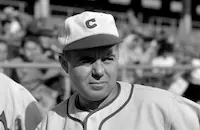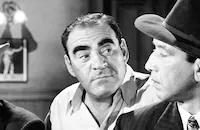April Showers

Brief Synopsis
Cast & Crew
James V. Kern
Jack Carson
Ann Sothern
Robert Alda
S. Z. Sakall
Robert Ellis
Film Details
Technical Specs

Synopsis
In San Francisco around the turn of the century, June and Joe Tyme perform in an unsuccessful vaudeville act known as "The Two Tymes." Shortly after they are fired because their act is so old-fashioned and dull, the Tyme's twelve-year-old son Buster, also known as "Small Tyme," returns home after leaving school to go on the stage. Although June insists that Buster return to school, his ebullient performance so impresses agent Harry Swift that he offers the family an immediate job--if Buster joins the act. June gives in, and now billed as "The Three Happy Tymes," the act is a huge success. Eventually, the Tymes are offered a twelve-week run in New York City. When they arrive, however, they learn that the city has a law forbidding children under sixteen from working. Joe suggests that they pass Buster off as a midget, but despite a convincing performance by Buster, the investigating committee is not fooled and the act is closed. Joe is so upset at losing his shot at the big time that he starts drinking. When he misses a performance, his reputation is ruined, and the Tymes are unable to get more bookings. In desperation, June takes a job as a waitress in the hotel where they live. For Joe, this is the final humiliation, and when he later learns that family friend Billy Shay wants to stop performing with a group of showgirls known as "The Six American Beauties," he suggests that Billy take his place in the act. Buster and June refuse to perform without Joe, however, and so he walks out on his family to force them to do as he wishes. With Billy performing Joe's role, the act is again successful. Joe continues drinking and is forced to move from the hotel. When Buster overhears Billy ask June to divorce Joe and marry him, he runs away in search of his father and unsuccessfully begs him to return to the act. As Christmas approaches, June learns that Joe is working in San Francisco as a waiter in a honky tonk on the Barbary Coast. She asks him to come back to them, but he responds that he will never live off the money she earns and advises her to get a divorce. "The Three Tymes" are offered work in a new show by Al Wilson, which is scheduled to open on New Year's Eve. When Wilson asks them for a punchier number, Buster suggests Joe's old baggy pants routine. Wilson loves the idea, but when Billy orders Buster to teach him the routine, the boy is unable to do it and in frustration, Billy hits him. Joe, who is making a Christmas Eve visit to the hotel, witnesses this and knocks Billy unconscious. Because Billy is now unable to perform, Wilson reluctantly agrees to let Joe take his place. Reunited, the three Tymes perform the closing number on New Year's Eve to great acclaim.

Director
James V. Kern
Cast

Jack Carson

Ann Sothern

Robert Alda

S. Z. Sakall
Robert Ellis
Richard Rober

Joseph Crehan

Billy Curtis

John Gallaudet
Philip Van Zandt

Ray Walker
Dewey Robinson
Lennie Bremen
George Sherwood
Jack Wise
Weaver Levy
Beal Wong
Philo Mccullough

Barbara Bates
Harry Shannon
Lila Leeds

Roy Gordon
Charles Williams
Tom Wells
Sailor Vincent
George Riley
Leo White
Edward Clark
Lester Dorr

Ralph Dunn
Charles Marsh
William Haade
Pat Flaherty

Penny Edwards
Fred Stanley
Donald Kerr
Fred Kelsey
Edna Harris

Jack Mower
Floyd Christy
Creighton Hale
Joe Bernard

Paul Maxey
Charles Jordan
Minerva Urecal
Grayce Hampton
Mary Stuart
Crew
Wesley Anderson
Jean Baker
Robert R. Benton
G. W. Berntsen
Ben Bone
Clayton Brackett
Herschel Brown
Herschel Daugherty
B. G. De Sylva
Walter Donaldson
Mildred Duncan
Ted Fetter
Leo F. Forbstein
Kim Gannon
Carl Guthrie
Les Guthrie
Ed Haley
Otto Harbach
Ray Heindorf
Ray Heindorf
Stuart Higgs
Karl Hoschna
Tony Jackson
William Jacobs
Lou Jennings
Vic Johnson
Stanley Jones
Mac Julian
Gus Kahn
Robert A. Keiser
Walter Kent
Dave Klat
Joe Laurie Jr.
James Leicester
Edward Madden
Henry I. Marshall
William Mcgann
Peter Milne
Stanley Murphy
Don Page
John Prettyman
Leroy Prinz
Bob Reilly
Thomas Reilly
Hugh Reticker
Tony Romano
Jack Scholl
Louis Silvers
John Philip Sousa
Marion Sunshine
Claude Swanner
Travilla
Egbert Van Alstyne
Johnny Wallace
Percy Wenrich
Perc Westmore
Jack Yellen

Videos
Movie Clip



Trailer
Film Details
Technical Specs

Articles
April Showers
Sothern had just come off a long run as MGM's "Queen of the Bs," a title earned largely through her work in the popular Maisie series. The daughter of a traveling vaudevillian herself, she occasionally made it into a big-budget picture at the studio, but her stardom was mostly confined to 10 films between 1939 and 1947 playing the role of a brassy adventuress originally intended for the late Jean Harlow. As Maisie, she ran the gamut of adventures based on whatever genre or setting happened to be most popular at the time: a retread of Harlow's Red Dust (1932), a boxing drama (with then husband Robert Sterling), as a defense plant worker during WW II, etc. But by the late 40s, the series had played itself out, and Sothern's contract was dropped by an ungrateful studio.
To top it off, the actress suffered a debilitating bout of hepatitis. This was her first picture after her illness, and although not a huge hit, Sothern fared much better in the years to come. She gave what many consider her finest screen performance in Joseph L. Mankiewicz's A Letter to Three Wives (1949), enjoyed TV success with two hit series in the 1950s, and finished out her long career with a run of unglamorous but critically acclaimed character roles, the last of which, as Tisha in The Whales of August (1987), earned her the only Oscar® nomination she received during her sixty year career with close to 100 performances.
Sothern's co-star in this picture, Jack Carson, also rarely had the chance to shine in major leading roles, although he made a number of memorable supporting appearances in major films, most of them at his longtime home studio Warner Brothers. Among his best known were the henpecked Hugo Barnstead in the James Cagney comedy The Strawberry Blonde (1941), the sleazy realtor Wally Fay in Mildred Pierce (1945), and frustrated studio publicist Matt Libby in A Star Is Born (1954).
A couple other performers in this picture should be familiar. S.Z. Sakall, affectionately known as "Cuddles," made a career as the jowl-jangling, English-fracturing, easily frustrated but lovable old fellow in more than 40 Hollywood films between 1940 and his death in 1955. Before that, the Hungarian-born former song composer and comic gag writer appeared in about 60 films in his native country and primarily in Germany.
The sleazy manager who almost rips the family apart is played by Robert Alda, no stranger to this kind of screen heavy (his villainous turn as a mobster in The Man I Love, 1947, is particularly memorable). Also a former vaudevillian, he made an impressive screen debut as George Gershwin in the biopic Rhapsody in Blue (1945) but was quickly relegated to mostly supporting parts. He was the father of actor Alan Alda.
In one scene, Robert Ellis, as Sothern and Carson's young son, impersonates a midget. His voice was supplied by famed voiceover artist Mel Blanc, who created the voices for all the great Looney Tunes cartoon stars, including Bugs Bunny, Daffy Duck, Sylvester, and Porky Pig.
This was the fourth film directed by former actor and screenwriter James Kern. Although he helmed only four more pictures over the next 20 years or so, he enjoyed much greater success on the small screen, directing such shows as My Three Sons, Maverick, 77 Sunset Strip, and Ann Sothern's second TV series.
Director: James V. Kern
Producer: William Jacobs
Screenplay: Peter Milne, based on the story "Barbary Host" by Joe Laurie, Jr.
Cinematography: Carl E. Guthrie
Editing: Thomas Reilly
Original Music: Ray Heindorf, original songs by Walter Kent
Cast: Ann Sothern (June Tyme), Jack Carson (Joe Tyme), Robert Alda (Billy Shay), S.Z. Sakall (Mr. Curley), Robert Ellis (Buster Tyme).
BW-94m. Closed captioning.
by Rob Nixon

April Showers
Quotes
Trivia
Notes
Writer Joe Laurie, Jr. started in vaudeville during the 1920s. Later he was a principal writer for the Eddie Cantor and Al Jolson radio shows and starred on the radio program Can You Top This?" He also worked as a staff columnist for Variety for twenty years. A contemporary source indicates that Jack Carson's guitar solo was dubbed by Tony Romano and his piano solo was dubbed by Dave Klatzkin. Although two contemporary sources list the film's running time as 78 minutes, material included in the copyright files gives the running time as 94 minutes, as do the Motion Picture Herald and Variety reviews. Jack Carson and Robert Alda reprised their roles in a February 23, 1949 Lux Radio Theatre broadcast, co-starring Dorothy Lamour.















